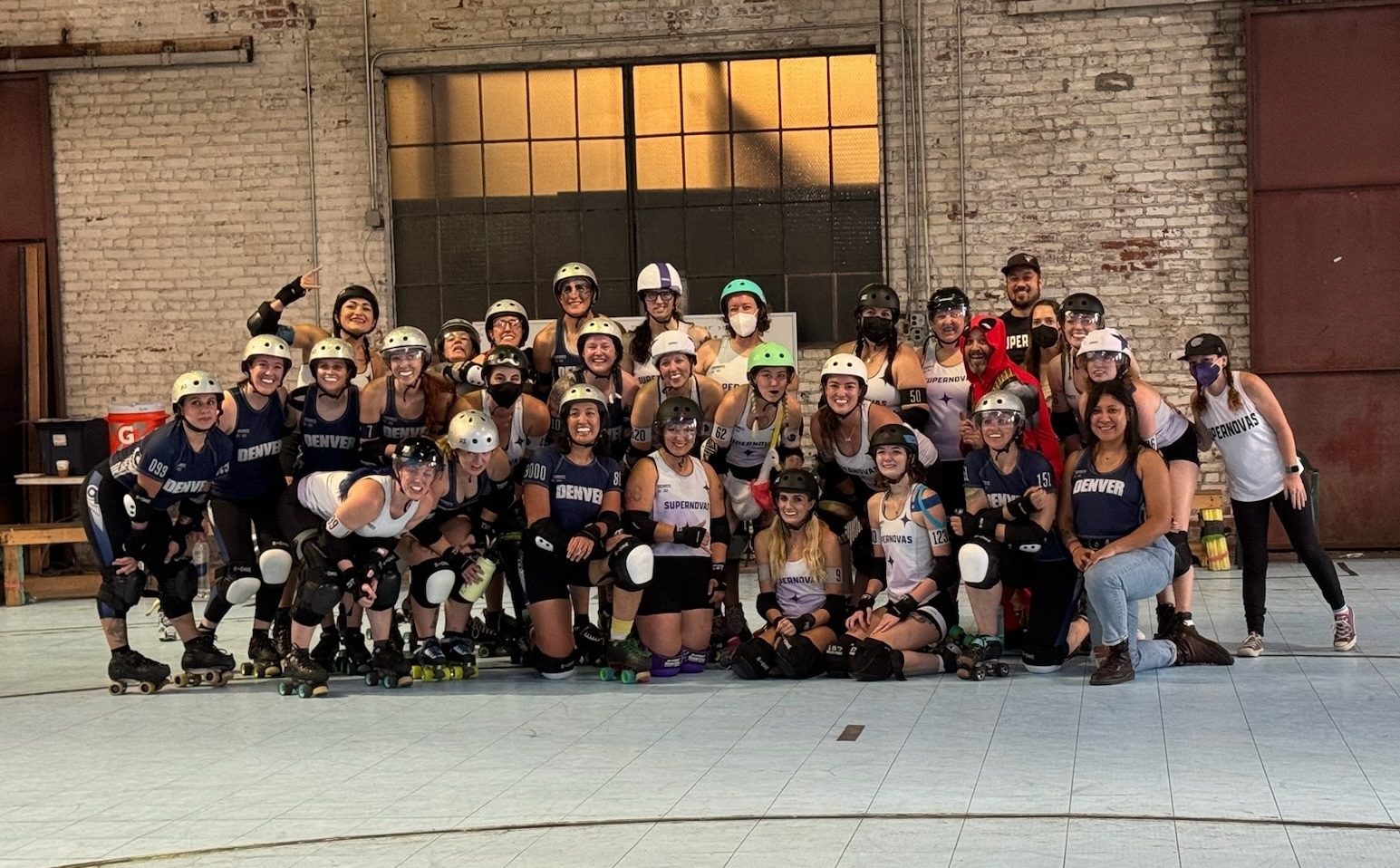Why create a coalition WFTDA program?
The Bay Area has a long history of incredible skating talent, from the early days of banked track roller derby to modern JRDA and WFTDA programs. But because of the region’s physical size and the growing financial challenges of living in this area, it’s increasingly difficult for a single WFTDA league to build a large pipeline of skaters that can challenge championship institutions like Rose, Arch Rival, or Denver.

Photo courtesy David Dyte.
Post-COVID, a talented athlete in this region may no longer be willing — or doesn’t have the financial resources — to commute 1-2+ hours 2-4 times a week to attend practices and scrimmages to be part of a single league’s WFTDA program. This can result in the splintering of talent, knowledge, and potential resources across the area.
The Supernovas program was created to help address this challenge. The goals of the program are as follows:
1. Give athletes across the Bay Area access to championship-level WFTDA training and travel opportunities.
The Supernovas program offers high-level training and athlete development with the goal of competing at the WFTDA championship level (top 3 in region) by 2026 and maintaining an area-wide pipeline to continue competing at that level in future years. Supernovas leadership has 10+ years experience in both the WFTDA and MRDA systems in coaching, championship-level skating, and officiating, and has developed a progressive training program modeled after national programs like Team Canada as well as championship-level WFTDA and MRDA programs.
Any athlete affiliated with a CDG league is eligible to try out for the program. This allows athletes from smaller leagues or those who live in more remote areas the ability to participate in a championship-level program without having to transfer; it also provides additional training and travel opportunities for athletes in larger leagues with existing WFTDA programs.
The Supernovas program selects 30 – 45 athletes for each two-year competitive cycle. Tryouts are competitive and no program spot is guaranteed. Athletes selected to join the program are placed onto one of two WFTDA charter teams or (if there are newer athletes for whom high-level training would be helpful for their development) an unteamed practice squad.
All tracks train together once per week at practice locations that rotate between CDG league practice spaces and other Bay Area locations to provide more equitable commute times for program members. In addition, athletes are given weekly on-skates skills homework and off-skates footage review, and have access to extracurricular training opportunities hosted by Supernovas training like speed classes, strength training, and role development. Athletes also receive regular feedback around their growth and development during the season.
2. Develop a positive, safe, and competitive environment for every athlete.
Long-term success at the championship level and for the greater Bay Area as a whole depends on growing every athlete who participates — not just those in the “top 15” of a WFTDA team. People may retire, need a life break, or have injuries. The Supernovas program is designed to support a healthy pipeline of athletes by continually helping all skaters in the program improve their skills and development, no matter their placement.
All members of the Supernovas program agree to a common Code of Conduct upon joining, and are expected to learn and execute the same fundamentals, core tactics, and overall strategies regardless of level.
The primary difference between an athlete placed on the “Supernovas A,” “Supernovas B,” or “Practice Squad” track is their score in three core areas:
- Speed: Reaction time during gameplay, speed of movement, speed of skill execution
- Knowledge: Understanding and execution of championship-level tactics and strategy.
- Consistency: Consistency of execution when attempting individual skills, role skills, team skills, tactics, and gameplay strategy. Consistency also takes clean and controlled skating into account — an athlete is not considered “consistent” in a form or skill if they go to the box 25% of the time they attempt it.
The program is also committed to having regular check-ins with all athletes throughout each two-year season and setting both short and long-term goals in accordance with each athlete’s focuses.
3. Develop championship-level training curriculum and help grow the overall area.
One of the biggest challenges for roller derby leagues worldwide is the lack of consistent and high-level training resources. Most programs operate with volunteer trainers — all of whom do incredible work — but many of these trainers have never skated or coached at a championship level, and programs often don’t have the resources to build this kind of training from the ground up. Smaller leagues who are lucky enough to have these resources usually dedicate them to their travel programs, often resulting in less knowledge passed down to newer athletes or splintered “home”/”travel” training.
We also strongly believe that to build a successful championship-level program, we need to support local leagues wherever possible in their own growth and development. Program athletes are expected to assist their local training programs where it’s appropriate by sharing the skills and strategies they learn. The Supernovas leadership team additionally provides a regularly-updated book of core skill curriculum to all CDG leagues along with training resources like video, access to program coaches and other guest trainers, and footage reviews.
Here is a playlist of selected training videos made available to Supernovas program members and CDG leagues.
Have questions about the overall Supernovas program, athlete tryouts, curriculum development, or other questions? Please reach out. We’d love to hear from you.
